
 |
|
|||||||
| Forum Rules | Firearms Safety | Firearms Photos | Links | Library | Lost Password | Email Changes |
| Register | FAQ | Calendar | Today's Posts | Search |
 |
|
|
Thread Tools | Search this Thread |
|
|
#1 |
|
Member
Join Date: November 29, 2016
Location: Long island ny
Posts: 67
|
I used the word headspace last time , rather then oal
Previous question I asked
I was wondering how to Determine overall length. I stated wrongly headspace , Although I was interested in Headspace, I did want oal. So, I stated just putting in a dummy Round closing the bolt And let the lands push the Bullet into the Case. Then adjust the bullet By several thousands Smaller. Seems OK Or use the hornady Gauges and get 10 Readings of an Average of 2.250 from ogive Take three thousandths off to have 2.247 Just don't know how to Translate this into oal. ? Just seat bullet in die until same Reading ? Last edited by Bytesniffer; December 31, 2016 at 08:19 AM. |
|
|
|
|
#2 |
|
Senior Member
Join Date: July 9, 2007
Location: Fort Pierce, Florida
Posts: 381
|
Determinating distance of base to lands
( is NOT OAL )( OAL is base to tip of bullet ) Many have done the job the first way you mentioned But the tools are available for the second way and I feel the tools will give you a more accurate measurement I am not shure what you are asking on your last question This answer is my best guess A competition Seating Die will make it easier to produce cartages to a specific length Whether it is OAL or Base to oglive length (for a certain distance to the lands) First you seat the bullet too long, measure, then adjust your die, seat the bullet again, measure, repeat as necessary until you get the bullet seated to the length you want |
|
|
|
|
#3 | |
|
Senior Member
Join Date: July 18, 2008
Posts: 7,249
|
Quote:
F. Guffey |
|
|
|
|
|
#4 |
|
Senior Member
Join Date: July 18, 2008
Posts: 7,249
|
The 'c' stands for case. I know it is a bit confusing but I have one reloading manual that goes back and forth with OAL and COL. Overall is like 'included'. And then there are those that are wondering; including what? The overall includes the case and bullet. And we do not want to forget the case has a 3 lengths. One of the lengths included the other two lengths.
F. Guffey Last edited by F. Guffey; December 31, 2016 at 10:57 AM. |
|
|
|
|
#5 |
|
Senior Member
Join Date: October 21, 2010
Posts: 1,028
|
I've always heard and seen, with one exception, case length called "case length".
I've always heard and seen, with one exception, COL means "cartridge overall length", as in the length over all of the components of the cartridge. Synonymous with OAL. I will continue to use those terms as such. ymmv |
|
|
|
|
#6 |
|
Senior Member
Join Date: June 8, 2016
Location: Cleveland, Ohio Suburbs
Posts: 1,756
|
When it comes to terminology things can sometimes get confusing. Our friends at SAAMI (Sporting Arms and Ammunition Manufacturers' Institute incorporated) have compiled a useful glossary of related terms. If you look at the linked page under Information and Specifications you will see "Glossary" listed. Using the SAAMI defined terms can make sure we are all on the same channel when we want to express ourselves with a question. For example:
Bullet Jump: The distance that a bullet must travel from its position at rest in the cartridge case to its initial engagement of the rifling. Free Bore: A cylindrical length of bore in a firearm just forward of the chamber in which rifling is not present. Associated with bullet jump. Headspace: The distance from the face of the closed breech of a firearm to the surface in the chamber on which the cartridge case seats. Cartridge Case Length: The dimensions from face of the head to the mouth. Working from the glossary affords the community a standardization of the terms we use. So if we use the SAAMI terminology we know we are all on the same channel.  Ron |
|
|
|
|
#7 |
|
Senior Member
Join Date: March 11, 2013
Location: Near Heart of Texas
Posts: 870
|
I suggest you think of COL/OAL as a check measurement. It is specific to the bullet you are using in your gun. Bullets themselves can vary greatly in OAL depending on the style & condition of the tip.
COL is often important when dealing with magazine fed guns & straight wall cases. Obviously the cartridges need to feed properly from magazines regardless of bullet-jump. In smaller, straight-wall cases, seating depth has a more pronounced effect on pressure so be cautious in reducing recommended OAL. |
|
|
|
|
#8 |
|
Member
Join Date: November 29, 2016
Location: Long island ny
Posts: 67
|
I can very easily and safely
Just duplicate the 7.62x51 Ammo I bought and fire in My rifle. Out of the box Unfired the 7.62 reads Case length 2.007/8 Overall length 2.775 Headspace 1.620 So I measure my chamber To be more precise then Factory ammo that is designed To fit any rifle I guess. Then I make these measurements And they seem to be way out Of spec. I have to adjust them to fit Saami specs ? This should be easy solution for Experienced reloaders. |
|
|
|
|
#9 | |
|
Senior Member
Join Date: June 8, 2016
Location: Cleveland, Ohio Suburbs
Posts: 1,756
|
Quote:
If you are using the Hornady L-N-L headspace gauge to take these measurements you are not doing it in accordance with the Hornady directions and that gauge will not accurately do the measurement you are trying to do. Here is an example: 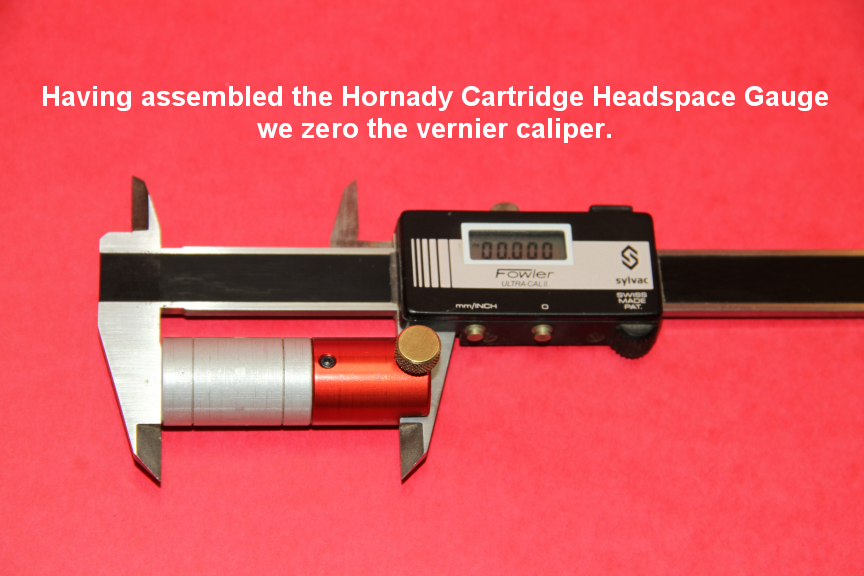 The gauge is zeroed with the D-400 collet (the 0.400" collet). I insert a brand new Federal Gold Medal Match .308 Winchester cartridge with a Sierra 168 grain HPBT bullet, not that bullet matters. 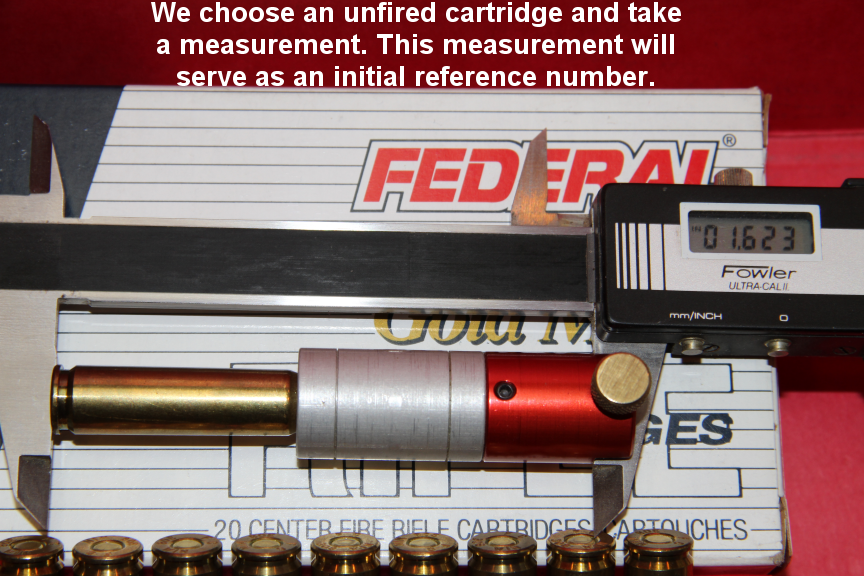 The caliper reads 1.623" and I can tell you that is a BS number, all it is would be a reference. The intent of this gauge is not to measure accurately and give an accurate measurement of the case head to datum on the shoulder. Here is the same gauge measuring an actual Headspace Gauge that is a known 1.630". 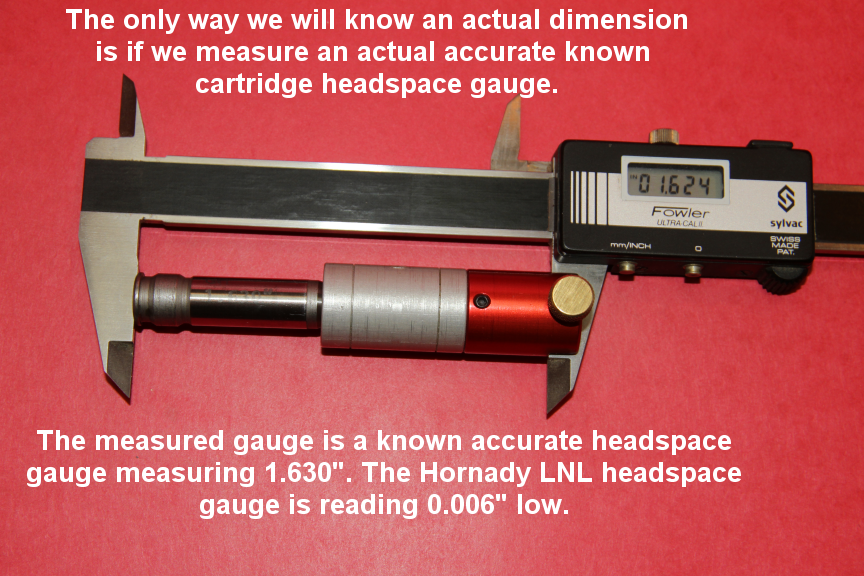 Note that the gauge reads 1.624" and not the actual 1.630" that the actual headspace gauge is. The Hornady gauge was designed and made to be used for comparison purposes, it was never intended to give actual dimensional numbers. This is why your numbers are always low and below SAAMI specifications, just like the gauge I have pictured. Why? The reason is because the D-400 collet is not a true 0.400". If you look very close at the hole the shoulder enters there is a slight, very slight radius. Thus the case shoulder rest on that radius and not a sharp 0.400" corner break. Ron |
|
|
|
|
|
#10 |
|
Member
Join Date: November 29, 2016
Location: Long island ny
Posts: 67
|
Ron,
I'm getting that reading By taking the factory 7.62 Round out of the box and placing In the very gauge that you and I Have . this is the reading I get. I don't don't know the answer That's way I ask questions. I do know , that if I take a round That reads 1.625 it is a little Tight tight in my chamber As I close bolt. If I take cartridge sized to 1.623 or lower it chambers Very smooth. Anything that reads above 1.625 I can not chamber in my Rifle 1.623 or below is great I pull the heads off the factory 7.62x51 ammo that I have no Issues firing I measure the length of case I measure headspace I measure the length to tip of bullet As stated previously. If I'm not following the directions correctly I missed something,but I do know What chambers in my rifle and What doesn't as a guide Last edited by Bytesniffer; December 31, 2016 at 11:48 PM. |
|
|
|
|
#11 |
|
Senior Member
Join Date: July 9, 2007
Location: Fort Pierce, Florida
Posts: 381
|
On new ammo 0.007 shorter than SAAMI minimum is normal
( your number of 1.620 ) But I make the shoulder 2 to 3 thou. shorter than the chamber I am loading for better accuracy, longer case life (It works the brass less ) If you have more than 1- 308 you probably need to size the cases to fit all your 308 guns It is not necessary to make your ammo to SAAMI specs. It would be nice if you can but not nessary If not just be aware it is different and may not fit all guns ( I have 5 rifles in 308, all the chambers are between 1 thou. bigger to 1/4 thou. smaller than SAAMI "0" so when I move the shoulder 2 to 3 thou. smaller these cases will fit all my 308s ) |
|
|
|
|
#12 |
|
Senior Member
Join Date: October 21, 2010
Posts: 1,028
|
Unless your bullet's ogive has the same profile as the factory bullet's ogive, you won't be able to duplicate the factory ammo in both head-to-ogive and COL/OAL dimensions. You can duplicate one dimension, but not both.
|
|
|
|
|
#13 |
|
Member
Join Date: November 29, 2016
Location: Long island ny
Posts: 67
|
The only reason I reference
7.62x51 is because my rifle Says 7.62 on the barrel And I bought 7.62x51 spec Ammo I know its dimension are almost Exact and internal dimensions Are little different. Only fired this ammo 7.62 from My rifle all measurements are From one rifle and 7.62 ammo I can copy the 7.62 ammo and Reload all day long with no issues. But I'm trying to understand to produce More specific ammo to my rifle and its a little confusing. |
|
|
|
|
#14 |
|
Senior Member
Join Date: June 8, 2016
Location: Cleveland, Ohio Suburbs
Posts: 1,756
|
The idea behind the gauge is for a comparison. You for example fire a round, now measure that round. You get a number. Now you start to resize the case. The idea is to adjust your resizing die to get your case, for example, 0.002" smaller than where you started. You are comparing the fired case to the resized fired case. Typically looking to reduce the case by 0.002". The numbers you get with the gauge are just a reference and used for a comparison. When I place an actual known headspace gauge in my Hornady gauge you see what it reads. That number doesn't mean anything.
If we read the directions for use they explain what the gauge is and how it gets used. The gauge is used as a comparator. At no point does Hornady mention the numbers you see are actual true dimensions. You are taking note of a change in a cartridge dimension. That is all we are doing. Ron |
|
|
|
|
#15 |
|
Member
Join Date: November 29, 2016
Location: Long island ny
Posts: 67
|
So, in studying and studying
The idea of precision loading I wish someone would have Suggested that buying this Hornady stuff. Oal gauge , bullet and competitor Was providing me with inaccurate information concerning loading Close to the lands. The hornady cartridge wasn't Fired in my rifle. Its not fit to my Chamber. A case fired in my rifle Is much more accurate For determining the bullet Jump to my lands then The hornady stuff. Sorry I bought all this junk. A hole drilled in a case fired From my rifle and a cleaning Rod to push the bullet to the Lands from my neck sized Case to keep bullet in place Is superior to the hornady Stuff. Hornady just sells little Bits of stuff to make more Money. You don't need it and its not As accurate. |
|
|
|
|
#16 |
|
Senior Member
Join Date: July 9, 2007
Location: Fort Pierce, Florida
Posts: 381
|
Bytesniffer --
I value your opinion of the Hornady equipment and will pass it on to others I had no idea it was that inaccurate I use the RCBS PRECISION MIC. and was not familiar with the Hornady gauges The RCBS bullet/land gauge is a PIA to use but is accurate, as are the other gauges in the set |
|
|
|
|
#17 |
|
Senior Member
Join Date: June 8, 2016
Location: Cleveland, Ohio Suburbs
Posts: 1,756
|
Learning curve at work. Next time ask before buying. Many of these things have come about in the last maybe 25 years with the exception of a few like Wilson Case Gauges. I began reloading / hand loading when I came home from Vietnam in 1972. Myself and those before me managed to make perfectly good and accurate ammunition less all the presently marketed "tools".
Don't misunderstand me, many of the tools out there are nice to have but certainly not necessary to make good reliable ammunition. One does need a good understanding of what happens when we chamber a round and squeeze the trigger. When you want to start loading accurate ammunition it becomes important to understand cartridge and chamber drawings and dimensional data. Personally unless you are working with a match chamber and match quality ammunition the whole distance off the lands thing is over rated in my opinion. Unless you have already checked concentricity does distance to lands matter? With variations in bullets out of the same box does it matter? Building really good high power ammunition involves a good number of important things over bullet jump. That just being my opinion. The Hornady gauge does what it is advertised to do. That is all it does. Firewrench044, I have to strongly agree as I prefer the RCBS Precision Mic set and have found my .308 set to be dead accurate to within 0.001 and about the same for my .223 set. Ron |
|
|
|
|
#18 |
|
Senior Member
Join Date: November 13, 2006
Posts: 8,350
|
OP,you seem to be learning a whole lot really fast. Well done!!
You are working with length relationships.Cartridge case to chamber,which goes into the headspace(actually applies to the rifle) and the ammo's fit to the rifles headspace.You seem to understand measuring that.You want enough head clearance for your rifle to easily lock up each time.Excessive head clearance causes case stretch.Case stretch shortens brass life. The benchrest accuracy folks do get particular about seating depth.It can make a difference,but I suggest one more length is important(maybe) Most(not all) 308 tech will be made to work with a 2.800 magazine box. So I suggest if you load your ammo to a nominal 2.800 length (It may be 2.785) that things should come together pretty well.There are exceptions.... |
|
|
|
|
#19 | ||
|
Senior Member
Join Date: July 18, 2008
Posts: 7,249
|
Quote:
I mention the Wilson case gage as a case gage because it is a datum based tool, For reloaders that understand the datum find the Wilson case gage a very accurate gage, others find it to be a drop in gage. And then one day it will dawn on someone Wilson gets it correct every time and Hornady has not figured it out after all these years.The hornady cartridge wasn't Fired in my rifle. Its not fit to my Chamber. Quote:
F. Guffey |
||
|
|
|
|
#20 | |
|
Senior Member
Join Date: June 8, 2016
Location: Cleveland, Ohio Suburbs
Posts: 1,756
|
Quote:
Thank You Ron |
|
|
|
|
|
#21 | |
|
Senior Member
Join Date: July 18, 2008
Posts: 7,249
|
Quote:
Reloaders had no clue the line was a round hole/circle; and there was an explanation; the explication read "and that is how they do it". A few forums continue to use the drawing and they have no clue what it means. And I said I collect datums, I make datums and on rare occasions I purchase datums and then there was that day at the gun show when I asked about a box of datums; the dealer claimed he did not have any datums, the happy shopper ahead of me asked; "What does a datum look like  and another shopper said; "I don't see any datums" and there was the third shopper, he asked "Where?" and another shopper said; "I don't see any datums" and there was the third shopper, he asked "Where?" . .F. Guffey |
|
|
|
|
|
#22 | |
|
Senior Member
Join Date: June 8, 2016
Location: Cleveland, Ohio Suburbs
Posts: 1,756
|
FGuffy:
Quote:
Ron |
|
|
|
|
|
#23 |
|
Staff
Join Date: March 4, 2005
Location: Ohio
Posts: 21,743
|
Bytesniffer,
You answered your own question with the photos. The difference in the two measurements was 0.587". Add that number to any ogive measurement you make with that same comparator insert and you will have COL ± any variation in bullet length that lot of bullets has. The Hornady gauge does not produce exact absolute measurements due to the hole radius. Neither does my copy of the RCBS Precision Mic, which measures a good quality (Dave Manson) headspace GO gauge off by about 0.002". The Hornady comparator is usually off around -0.004 to -0.008, with a few units getting outside that. But it doesn't matter that the Hornady comparator is off of absolute. All you care about is the difference between the maximums in your chamber and what you set on the gauges. It's the jump and not its distance from the case head that matters. Also, the comparator and the RCBS PM both touch the bullet close to where your seating die presses down on it, so it's at the right place for making seating die adjustments that correspond well. I think your use of 0.003" from the lands does not make sense for a couple of reasons. First, 0.003" doesn't make much difference to pressure, as the plot below reveals. It'll still be very close to the pressure you get from full contact with the lands, so it doesn't seem to be getting you any advantage in pressure. Second, bullets are less exact than that, owing to the fact they come off different sets of tooling that aren't perfectly identical and aren't set up and running on the same machine. As a result, the exact location of the part of the ogive that touches the lands can be off by 0.003". In the table below are the results of my measurements of 15 Sierra 150 grain MatchKings. You can see ogives differ by up to about 0.008" with respect to the base. I think you want to back off at least 0.020" to make your first tests of difference from contact with the lands. The second reason for that bigger step is that the cartridge case moves forward during firing to contact the headspace surface. If you want to achieve exact positioning of the bullet distance off the lands, you want a consistent difference (again, not absolute values from the head; just the difference) between the case headspacing surface (in this case, the shoulder) and the bullet ogive position. Just make separate case and ogive position measurements and look at the difference between them for consistency and for adjusting the seating die. You'll get a couple thousandths difference just because the seating die works with respect to the head instead of the headspacing surface. 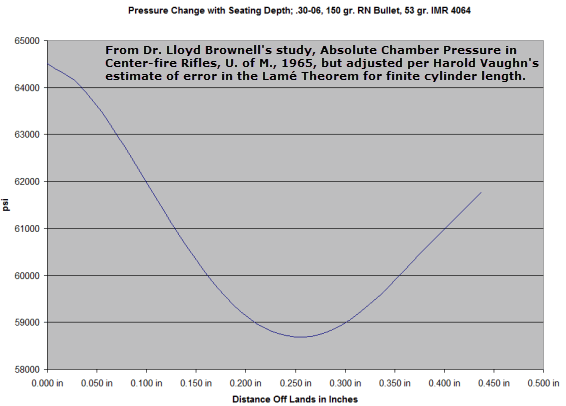 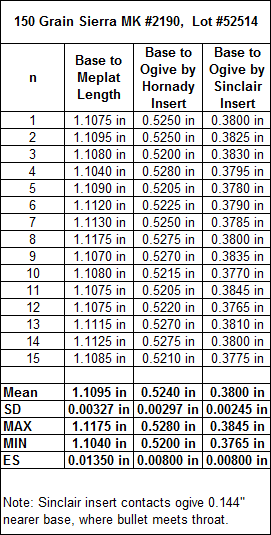 The terminology difference just has to do with English usage changing over time. If I look in my Webster's 2nd Edition (printed in 1948), there are two spellings: Overall (initial "O") and, Over-all (initials "OA") At that time, the former was used to mean "taken altogether" as in, "overall, it was a nice house" (this usage goes all the way back to Chaucer). The second applied strictly to the length of a thing, as in, "the boat was 13 feet over-all". As a result, prior to 1950, Cartridge Over-all Length, or COAL would have been a standard set of initials. But when I look in my Webster's 3rd Edition (printed in 1962), the hyphenated form is completely eliminated and 'overall' is the only spelling for both meanings. As a result, COL and OL, would be current usage and COAL and OAL are initials for the obsolete usage, though many load manuals still have them out of what I suppose to be habit.
__________________
Gunsite Orange Hat Family Member CMP Certified GSM Master Instructor NRA Certified Rifle Instructor NRA Benefactor Member and Golden Eagle |
|
|
|
|
#24 |
|
Senior Member
Join Date: January 3, 2017
Posts: 1,583
|
We have cartridge base to neck; case length
cartridge base to ogive (where the bullet reaches caliber diameter) we have overall length or cartridge overall length which is the distance from the cartridge base to tip of the bullet. For me, as a hunter, I need to know that my round will fit in the magazine and chamber in my gun. That means the cartridge overall length is important because it has to fit and that the case length allows the round to chamber. The only time I need worry about cartridge base to ogive dimension is if I need to know the bullet jump. It is unlikely that a round that fits the magazine will come close to the lands - especially with a pointed bullet. Last edited by ShootistPRS; January 4, 2017 at 05:29 PM. |
|
|
 |
|
|